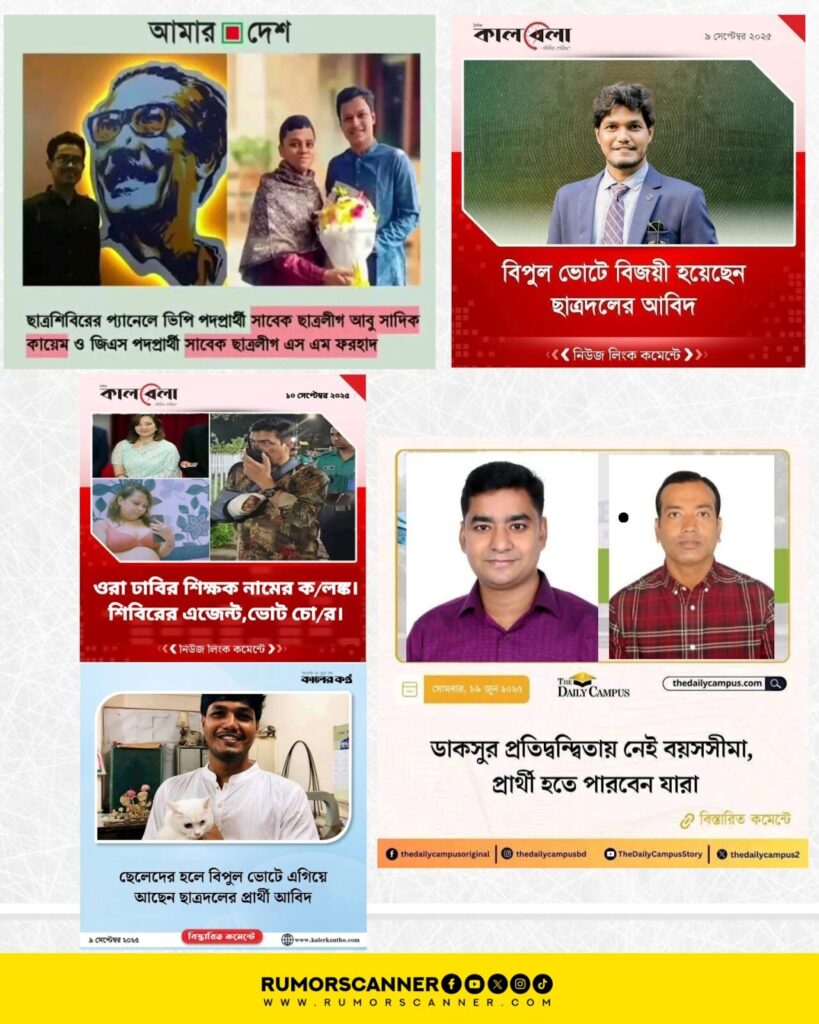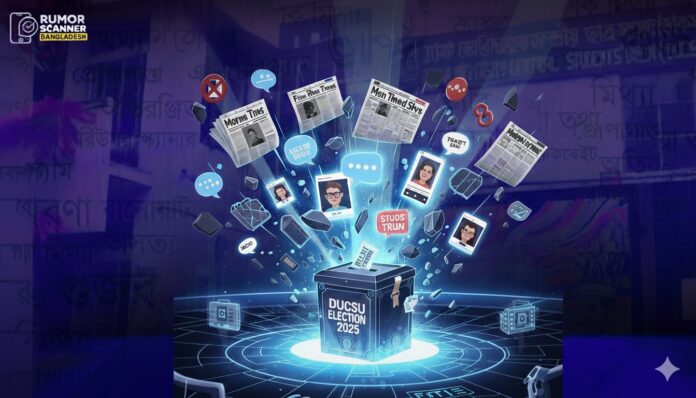- Identified 51 instances of misinformation related to the DUCSU election.
- Predominantly video-centric misinformation, with Facebook being the primary platform for dissemination.
- The Islami Chhatra Shibir-supported United Student Alliance panel was the subject of the highest volume of misinformation.
- Individually, the Bangladesh Jatiyatabadi Chhatra Dal-supported Vice President candidate, Abidul Islam Khan, was targeted by the most misinformation.
- Misinformation disproportionately affected male candidates.
- The youth demographic (aged 18–35) was involved in the majority of misinformation incidents.
- University administration officials were also targets of false information.
The Dhaka University Central Students’ Union (DUCSU), often referred to as the country’s second parliament, held its eighth election in independent Bangladesh on September 9, 2025. Candidates from the Bangladesh Islami Chhatra Shibir-supported United Student Alliance panel secured victory in 23 out of 28 posts, including Vice President (VP), General Secretary (GS), and Assistant General Secretary (AGS). The election garnered significant interest not only among university students but also across various segments of the public. Amid this widespread engagement, the DUCSU election became a breeding ground for rampant online rumors. Drawing from past experiences, Rumor Scanner proactively monitored online content related to the DUCSU election from before the announcement of the election schedule. Their efforts yielded notable results: by September 15, 2025, a total of 51 rumors related to the election were identified. In terms of their nature, 40 (80%) were classified as false, 7 (14%) as misleading, and 4 (8%) as distorted. To curb the spread of misinformation in real-time, Rumor Scanner launched a live update service on their website on the night of September 9, 2025, through which five rumors were promptly debunked with verified facts.
Panels vs. Rumors: The Invisible Battle of the Election
The 2025 DUCSU election saw the highest volume of misinformation targeting the Bangladesh Islami Chhatra Shibir-supported United Student Alliance panel, with 29 instances of false information recorded. Approximately 76% of these were designed to create a negative perception of the panel. The second most targeted was the Bangladesh Jatiyatabadi Chhatra Dal-supported panel, which faced 24 instances of misinformation, 75% of which were detrimental to its reputation. Misinformation was not limited to these two panels; other panels were also affected. The Independent Student Unity panel, led by former Anti-Discrimination Student Movement spokesperson Umama Fatema, was linked to 4 instances of misinformation (75% negative). Similarly, the Bangladesh Democratic Students’ Parliament-supported Anti-Discrimination Students’ Council panel faced 4 instances of false information (75% negative). Additionally, Rumor Scanner identified 3 instances of misinformation targeting the Resistance Council panel, supported by the Democratic Student Alliance, a coalition of leftist student organizations.
Proliferation of Misinformation Surrounding Candidates
In the DUCSU election, the candidate most targeted by misinformation was Bangladesh Jatiyatabadi Chhatra Dal-supported Vice President (VP) candidate Abidul Islam Khan, with 10 instances of false information recorded. Approximately 73% of these rumors were crafted to foster a negative perception of him. Following closely was Md Abu Shadik (Shadik Kayem), the VP candidate from the Bangladesh Islami Chhatra Shibir-supported United Student Alliance panel, faced 9 rumors, with about 56% being in his favor. Additionally, S M Farhad, the General Secretary (GS) candidate from the same panel, was subject to 5 rumors, 60% of which were negative. Other candidates impacted include independent VP candidate Shameem Hossen with 4 rumors (75% in his favor), Umama Fatema, VP candidate from the Independent Student Unity panel, with 3 rumors (approximately 67% negative), Abdul Kader, VP candidate from the Bangladesh Democratic Students’ Parliament-supported Anti-Discrimination Students’ Parliament panel, with 2 rumors (all negative), and Abu Baker Majumder, GS candidate from the same panel, with 2 rumors (1 negative). Furthermore, Meghmallar Bosu, GS candidate from the Democratic Student Alliance-supported Resistance Council panel, faced 2 negative rumors, as did Fatima Tasnim Zuma, candidate for the Liberation War and Democratic Movement Affairs Secretary from the United Student Alliance panel. Single instances of negative misinformation targeted Sheikh Tasnim Afroz (Emi), VP candidate from the Democratic Student Alliance-supported panel, Al Sadi Bhuiyan, GS candidate from the Independent Student Unity panel, Arafat Chowdhury, independent GS candidate, and Md Mohiuddin Khan, Assistant General Secretary (AGS) candidate from the United Student Alliance panel.
Rumors Surrounding Candidates by Gender
Evidence has been found of rumors being spread involving 10 male candidates and 3 female candidates who participated in the DUCSU election. Among these, the number of rumors involving male candidates stands at 38, while those involving female candidates is 6.
University Administration Officials Also Did Not Escape
In addition to the candidates participating in the DUCSU election, rumors were observed spreading online against the university’s Vice-Chancellor and multiple individuals from the university administration responsible for election duties. One instance of false information was spread against Vice-Chancellor Professor Dr. Niaz Ahmed Khan. Three pieces of misinformation were propagated against Shehreen Amin Bhuiyan (Monami), Assistant Proctor and Assistant Professor at the university. Additionally, one rumor was spread involving Dr. A. K. M. Nur Alam Siddiki, Assistant Professor in the Chemistry Department and another Assistant Proctor at the university.
Rumors Spread Involving Political Parties
Centering the DUCSU election, two rumors (against) were spread involving the Bangladesh Nationalist Party (BNP), one (in favor) involving the activities-banned Bangladesh Awami League, one (against) involving the Gono Odhikar Parishad, and one (against) involving the National Citizen Party (NCP). Furthermore, evidence was found of three false pieces of information (approximately 67% against) being propagated involving the Bangladesh Chhatra League, the brotherly organization of the Awami League, which has been declared banned.
Other Individuals Involved in Rumors
Surrounding the DUCSU election, two pieces of false information each were propagated involving Interim Government Chief Adviser Dr. Muhammad Yunus and BNP Acting Chairman Tarique Rahman. Additionally, evidence was found of one rumor each being spread involving former President late Ziaur Rahman, former Prime Minister Begum Khaleda Zia, former General Secretary of Bangladesh Chhatra League Golam Rabbani, President of Bangladesh Jatiyatabadi Chhatra Dal Rakibul Islam Rakib, General Secretary of Bangladesh Jatiyatabadi Chhatra Dal Nasir Uddin Nasir, online activist Pinaki Bhattacharya, and online activist Elias Hossain.
Government and Security Forces Also Targeted by Rumors
The interim government did not escape the clutches of rumors. One rumor was observed being spread involving the government in the DUCSU election. In addition to the government, rumors were also spread involving the government’s security forces, the police and army. Evidence was found of five rumors being propagated involving the Bangladesh Police, one of which involved Masud Alam, Deputy Commissioner of Police for the Ramna Division of Dhaka Metropolitan Police. Furthermore, Rumor Scanner identified one rumor being spread involving the Bangladesh Army
Media Also on the List of Misinformation Propagation
In the DUCSU election issue, at least 56 media outlets published false information in five different incidents. Among these, two media outlets propagated three pieces of false information each. Additionally, 12 media outlets published two pieces of false information each. Evidence was found of the remaining 42 media outlets publishing one piece of false information each.
Fake Photocards in the Name of Media
Media outlets also fell victim to fake information centering the DUCSU election. Five fake photocards were observed being spread in the names of various media outlets. Among these, two in the name of Kalbela, one in the name of The Daily Campus, one in the name of Kaler Kantho, and one in the name of Amar Desh were disseminated.

Analysis of Rumor Types
Among the total identified instances of misinformation, video-centric rumors were the most prevalent, accounting for 26 cases (52%). Additionally, 19 information-centric rumors (38%) and 6 image-centric rumors (12%) were recorded.
Facebook as the Primary Source of Rumors
Of the 51 rumors identified during the DUCSU election, Facebook was the platform with the highest dissemination, hosting 46 rumors, which constitutes approximately 90% of the total. Instagram accounted for 18 rumors (approximately 35%), while YouTube had 6, and TikTok, X, and Threads each had 2 rumors. However, as some rumors were spread across multiple platforms, the total number of platform-based rumors (46 + 18 + 6 + 2 + 2 + 2 = 76) appears higher than the total number of unique rumors (51).
Youth as the Primary Target of Rumors
Age-based analysis revealed that 16 individuals aged 18–35 (youth) were involved in the spread of misinformation during the DUCSU election. Additionally, evidence was found of rumors involving 11 middle-aged individuals (36–59 years) and 5 elderly individuals (60 years and above).
Methodology
This study was prepared based on reports and live updates published on Rumor Scanner’s website concerning the DUCSU election. Data and information from every fact-check report related to DUCSU, published between June 25 and September 15, 2025, were collected and analyzed. Subsequently, for reader accessibility, the data was categorized into various segments and presented through graphs, charts, and analytical writing.
Feature Credit: Gemini






